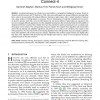Free Online Productivity Tools
i2Speak
i2Symbol
i2OCR
iTex2Img
iWeb2Print
iWeb2Shot
i2Type
iPdf2Split
iPdf2Merge
i2Bopomofo
i2Arabic
i2Style
i2Image
i2PDF
iLatex2Rtf
Sci2ools
TCIAIG
2016
2016
Online Adaptable Learning Rates for the Game Connect-4
—Learning board games by self-play has a long tradition in computational intelligence for games. Based on Tesauro’s seminal success with TD-Gammon in 1994, many successful agents use temporal difference learning today. But in order to be successful with temporal difference learning on game tasks, often a careful selection of features and a large number of training games is necessary. Even for board games of moderate complexity like Connect-4, we found in previous work that a very rich initial feature set and several millions of game plays are required. In this work we investigate different approaches of online-adaptable learning rates like Incremental Delta Bar Delta (IDBD) or Temporal Coherence Learning (TCL) whether they have the potential to speed up learning for such a complex task. We propose a new variant of TCL with geometric step size changes. We compare those algorithms with several other state-of-the-art learning rate adaptation algorithms and perform a case study on the ...
| Added | 10 Apr 2016 |
| Updated | 10 Apr 2016 |
| Type | Journal |
| Year | 2016 |
| Where | TCIAIG |
| Authors | Samineh Bagheri, Markus Thill, Patrick Koch, Wolfgang Konen |
Comments (0)

